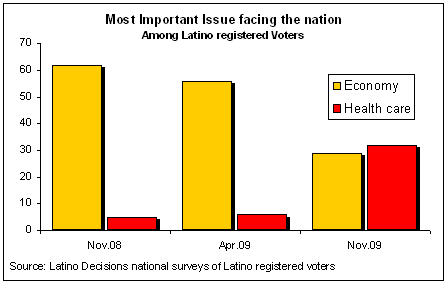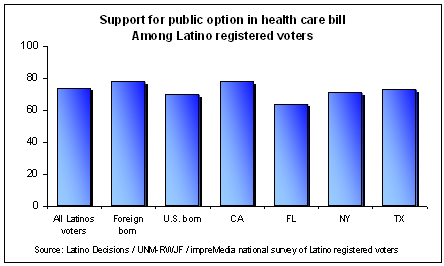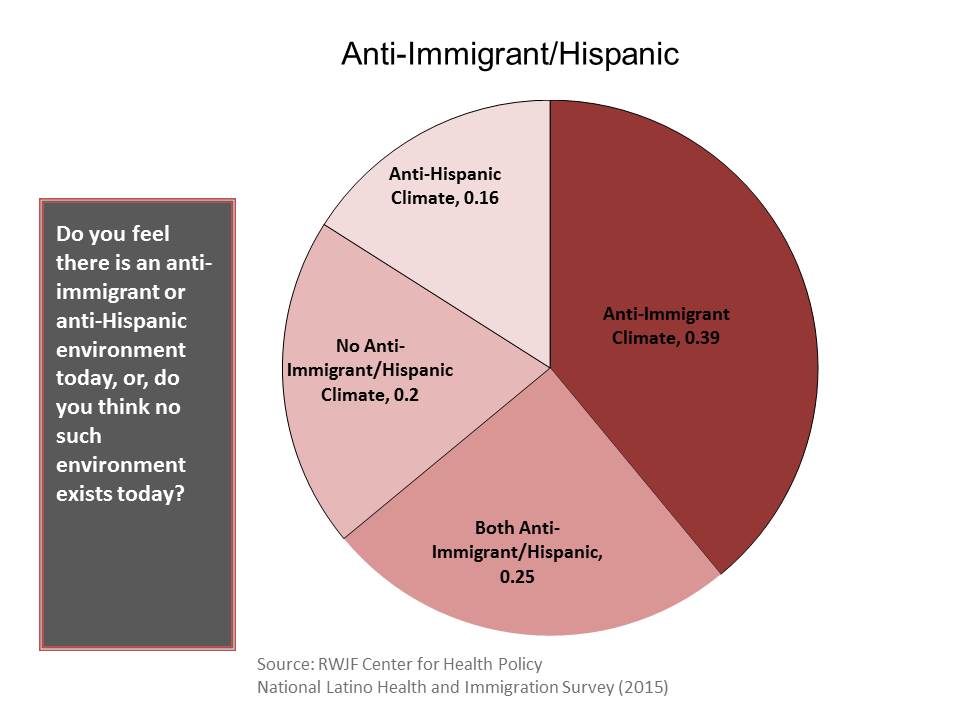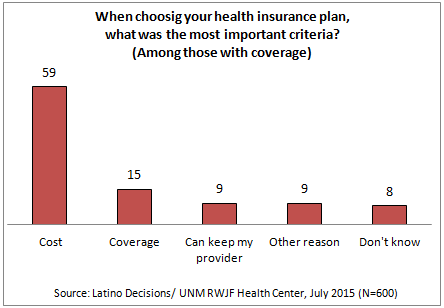A new poll of Latino/Hispanic registered voters finds widespread consensus about the importance of health care reform and significant support for robust efforts in this direction. The poll, commissioned by the Robert Wood Johnson Foundation’s Center for Health Policy at the University of New Mexico, and impreMedia and administered by Latino Decisions, queried 1,000 Hispanic registered voters from November 1‐16 regarding their views about politics in general, the nation’s health care debate and their views of the administration.
Overall, Latino registered voters are very supportive of efforts to reform the nation’s health care system, and show especially strong support for including the ‘public option’ as part of the reform effort. While President Obama continues to enjoy strong support from the Latino electorate, less than 1 in 7 survey respondents felt the needs of the Hispanic community were fully taken into account during the health reform debate.
Health Care the Nation’s Most Important Problem
When asked what “the most important issue that President Obama and the Congress should address over the next year”:
• 32% reported health care, 30% identified the economy—including jobs and mortgage issues, 17% picked immigration as the biggest issue, while another 9% identified the wars in Iraq and Afghanistan.
• In April 2009, a Latino Decisions poll found 56% of Latinos stated the economy was the top issue, compared to just 6% who mentioned health care
• Priorities differ between native-born and naturalized citizens.
• Naturalized citizens identified the economy (33%) and immigration (28%) more frequently than health (25%) and the wars (4%).
• US‐born Hispanics identified health (37%), the economy (28%), and the wars in Iraq and Afghanistan (14%) as more urgent than immigration (7%).
Urgency of Health Reform
There is widespread consensus among Latino/Hispanic citizens regarding the urgency of both health care reform, and immigration reform.
• Among all Hispanic registered voters, 84% report that it is important for Congress to pass a bill on immigration before the 2010 election.
• Similarly, 86% report that it is important for Congress to pass a bill on health reform before the 2010 election.
• Both are considered more urgent to the foreign-born naturalized citizens (85% and 91% respectively) than to the US born (82% for each).
• When asked which of the two was the more important, two‐thirds (67%) of respondents picked health reform, compared to just 20% for immigration reform, and 10% thought they were of equal importance.
• This order of priority is consistent between immigrant citizens and the native-born, with 62% of the foreign-born and 69% of the U.S. born indicating health care was more important.
• While immigration reform looms as a very important concern to the Latino electorate, passing health care reform is such a grave concern that it’s importance outpaces immigration reform by over a 3‐1 margin
Policy Preferences in Health Reform
• Hispanics prefer some form of universal health insurance, even if it means higher taxes, to the current system, 61% to 28%
• The number of uninsured (30%) is most often cited as the principal motivation for reform, with cost control (23%) and affordability (22%) rounding out the top three.
• Those opposed to universal health insurance are only partially motivated by anti‐government sentiment, which receive great attention in the media. Among those opposed to universal health insurance, 33% said they were against
government take‐over, however more than a quarter (27%) stated they needed more information or clarity on the health care reform process
• The public option has robust support among Hispanic voters. 74% of Latinos would “somewhat” or “strongly” support its inclusion in the final bill. This number is significantly higher than in the nation as a whole (56%, CNN 11/15;
61% CBS, 11/16);
• 67% think everyone should be covered, without regard to citizenship or immigration status, while only a quarter (25%) would restrict benefits to citizens and legal residents only. Not surprisingly, immigrant citizen sentiment
favors full inclusion (80%) at significantly higher rates than US born 59%, however a clear majority of Latinos, both foreign and U.S. born support inclusion in health care services to all those living in America.
Hispanics’ needs are great, sense of influence modest.
The issue of health is of critical importance to many respondents, with high rates of uninsured Nevertheless, Hispanics have a decidedly mixed evaluation regarding whether their views are considered.
• 20% report having gone without insurance for at least one month sometime in the last two years, and 16% were without insurance on the day of their interview;
• Only 14% believe that public officials care very much about the Hispanic communities health care needs when crafting the health legislation, and 36% said only somewhat. A substantial percentage ‐‐ 44% ‐‐ report believing that
public officials don’t consider their needs much or at all.
• Regarding the quality and costs of the current medical system, 49% of Latino voters said they were very satisfied with the quality of care they receive, and 31% were very satisfied with the costs of care, suggesting many in the Latino
community are less than satisfied about their current health care situation.
Congress and President enjoy approval among Latinos
President Obama remains widely popular among Hispanic registered voters.
• 74% somewhat or strongly approve of the job being done by President Obama, only 23% disapprove; in April 2009, 81% of Hispanic voters approved of Obama
• Obama is somewhat more popular among foreign-born Latinos, holding 79% approval, compared to 72% among U.S. born
• 52% somewhat or strongly approve of the performance of Congress, 37% disapprove; in April 2009, 67% of Hispanic voters approved of Congress
Statement on Methodology
Latino Decisions is a cooperative venture of Pacific Market Research and Dr. Gary M. Segura of Stanford University and Dr. Matt Barreto of the University of Washington. Questions can be directed to [email protected] or
[email protected]. In November 2009 Latino Decisions fielded a national survey of Latino registered voters on issues related to health care reform. Latino Decisions partnered with the Robert Wood Johnson Foundation Center for Health Policy at the University of New Mexico, and impreMedia, and all phone calls were administered by Pacific Market Research in Renton, WA. The poll was overseen by Drs. Segura and Barreto, experts in Latino public opinion. A total of 1,000 Latino registered voters were interviewed, with a margin of error of +/‐ 3.1%. Latino
registered voters were identified through a Spanish‐surname match against the statewide list of registered voters in 21 states. Latino Decisions selected the top 21 states with the highest number of Latino registered voters, and taken together, they account for over 90% of the Latino electorate. Telephone calls were conducted in English and Spanish, at the discretion of the respondent, and all respondent’s who were interviewed self‐identified as Latino or Hispanic and registered to vote. Overall, 54% of respondents were born in the United States, 39% were foreign born, and 6% born in
Puerto Rico and 65% of interviews were completed in English and 35% in Spanish. The survey was approximately 22 minutes long, and was fielded from November 1 – 16, 2009. For more information, please visit www.latinodecisions.com or call 425-336-7000.

 Toplines HERE
Toplines HERE


